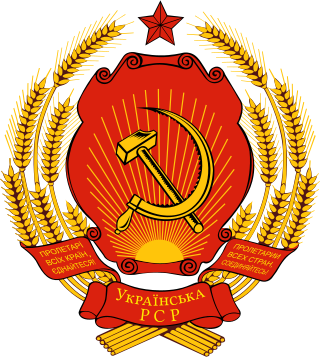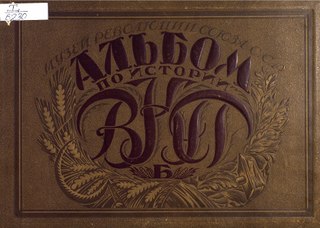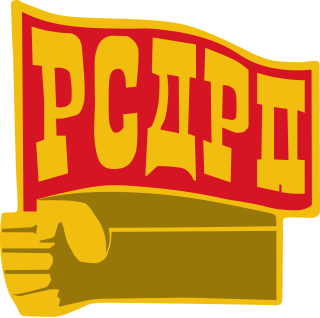Related Research Articles

The Bolsheviks, led by Vladimir Lenin, were a far-left faction of the Marxist Russian Social Democratic Labour Party (RSDLP) which split with the Mensheviks at the Second Party Congress in 1903. The Bolshevik party, formally established in 1912, seized power in Russia in the October Revolution of 1917, and was later renamed the Russian Communist Party, All-Union Communist Party, and Communist Party of the Soviet Union. The party's ideology, based on Leninist and later Marxist–Leninist principles, is known as Bolshevism.

The Communist International (Comintern), also known as the Third International, was an international organization founded in 1919 that advocated world communism, and which was led and controlled by the Communist Party of the Soviet Union. The Comintern resolved at its Second Congress in 1920 to "struggle by all available means, including armed force, for the overthrow of the international bourgeoisie and the creation of an international soviet republic as a transition stage to the complete abolition of the state". The Comintern was preceded by the dissolution of the Second International in 1916. Vladimir Lenin, Leon Trotsky, and Joseph Stalin were all honorary presidents of the Communist International.

The Social Democracy of the Kingdom of Poland and Lithuania, originally the Social Democracy of the Kingdom of Poland (SDKP), was a Marxist political party founded in 1893 and later served as an autonomous section of the Russian Social Democratic Labour Party. It later merged into the Communist Workers Party of Poland. Its most famous member was Rosa Luxemburg.
The Trudoviks were a democratic socialist political party of Russia in the early 20th century.

The Communist Party of Latvia was a political party in Latvia.
Union of Russian Social-Democrats Abroad was an organization of emigrant Russian socialists, set up in Geneva in 1894 on the initiative of the Emancipation of Labour group. It had its own printing press for issuing revolutionary literature, and published the newspapers Rabotnik and Listok Rabotnika. Initially, the Emancipation of Labour group directed the Union and edited its publications. But afterwards opportunist elements gained the upper hand within the Union.

The Communist Party of Ukraine was the founding and ruling political party of the Ukrainian SSR operated as a republican branch of the Communist Party of the Soviet Union (CPSU).

Yuzhny Rabochy was a Social-Democratic group formed in the South of Russia in the autumn of 1900 around an illegal newspaper of that name. Among the members of the group and the editors of the paper were, at various times, Isaak Lalayants, A. Vilensky, O. A. Kogan, B. S. Zeitlin, Y. Y. and Y. S. Levin, and V. N. Rozanov.
Siberian Social-Democratic Union was a Siberian organization of Social Democratic groups. It was formed in the spring of 1901, by the initiative of the Tomsk Social-Democrats, including Social-Democratic groups from Krasnoyarsk, Irkutsk, and the Taiga. In the end of 1901 the union adopted a programme which defined its mission as fighting for political freedom of the proletariat, and for socialism. The union was initially dominated by 'economists'.

The Socialist International (SI) is a political international or worldwide organisation of political parties which seek to establish democratic socialism, consisting mostly of social democratic political parties and labour organisations.

The Ukrainian Social Democratic Labour Party, also commonly known as Esdeky, was a social-democratic political party in the Ukrainian People's Republic. The party was reformed in 1905 at the Second Congress of the Revolutionary Ukrainian Party and was pursuing Marxism through the Social Democratic Party of Germany's Erfurt Program as well as national and cultural autonomy. Party leaders were Volodymyr Vynnychenko, Symon Petliura, Mykola Porsh, Dmytro Antonovych, Lev Yurkevych, Mykhailo Tkachenko, and Mykola Kovalsky.

The 5th (London) Congress of the Russian Social Democratic Labour Party was held in London between May 13 and June 1, 1907. The 5th Congress had the largest attendance of the Congresses of the unified RSDLP. Thirty-five sessions of the Congress were held in the Brotherhood Church in Hackney, during which stormy debates took place.
Emancipation of Labour was the first Russian Marxist group. It was founded in exile by Georgi Plekhanov, Vasily Ignatov, Vera Zasulich, Leo Deutsch, and Pavel Axelrod, at Geneva (Switzerland) in 1883. Deutsch left the group in 1884 when he was arrested and sent to Siberia and Sergei Ingerman joined in 1888. The group published the first Russian language translations of many works by Karl Marx and distributed them. It became the major adversary to the Narodniks on the left wing of politics in the Russian Empire.

The Party of Socialist-Revolutionaries, also known as the Socialist Revolutionary Party, was a major political party in the late Russian Empire, during both phases of the Russian Revolution, and in early Soviet Russia.

The Mensheviks were a faction of the Marxist Russian Social Democratic Labour Party (RSDLP) which split with Vladimir Lenin's Bolshevik faction at the Second Party Congress in 1903. The Mensheviks were led by Julius Martov and Pavel Axelrod.

The 2nd Congress of the Russian Social Democratic Labour Party was held from July 30 to August 23 1903, starting in Brussels, Belgium and ending in London, England. Probably as a result of diplomatic pressure from the Russian Embassy, Belgian police had forced the delegates to leave the country on August 6. The congress finalized the creation of the Marxist party in Russia proclaimed at the 1st Congress of the RSDLP. This congress brought the first split within the party, between the Bolshevik faction led by Lenin, and the Menshevik faction led by Martov.

The Russian Social Democratic Labour Party (RSDLP), also known as the Russian Social Democratic Workers' Party or as the Russian Social Democratic Party, was a socialist political party founded in 1898 in Minsk.

Democratic centralism is the organisational principle of communist states and of most communist parties to reach dictatorship of the proletariat. In practice, democratic centralism means that political decisions reached by voting processes are binding upon all members of the political party. It is mainly associated with Leninism, wherein the party's political vanguard of revolutionaries practice democratic centralism to select leaders and officers, determine policy, and execute it.

The 1st Congress of the RSDLP was held between 13 March – 15 March 1898 in Minsk, Russian Empire in secrecy. The venue was a house belonging to Rumyantsev, a railway worker on the outskirts of Minsk. The cover story was that they were celebrating the nameday of Rumyantsev's wife. A stove was kept burning in the next room in case secret papers had to be burnt.

The Russian Social Democratic Labour Party (of Internationalists) (Russian: Российской социал-демократической рабочей партии (интернационалистов)), initially known as the United Social Democrats-Internationalists, was a political party in Russia.